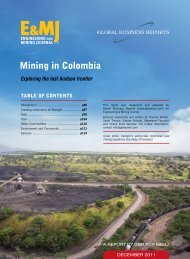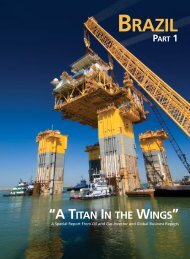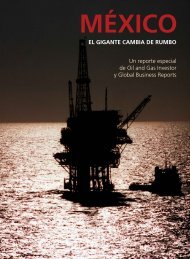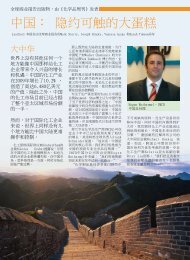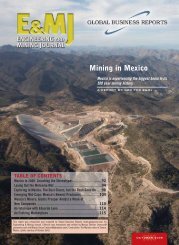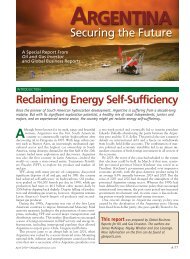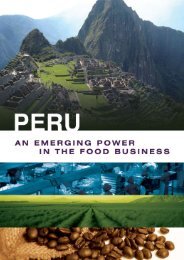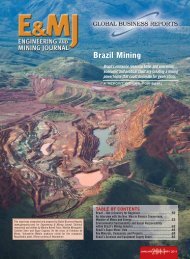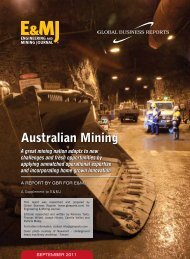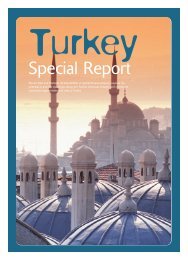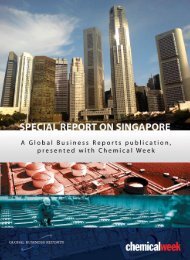Indonesia Mining 2012 - GBR
Indonesia Mining 2012 - GBR
Indonesia Mining 2012 - GBR
Create successful ePaper yourself
Turn your PDF publications into a flip-book with our unique Google optimized e-Paper software.
<strong>Mining</strong> IN <strong>Indonesia</strong><br />
wages, we are seeing a high degree of personnel<br />
mobility between companies, both<br />
locally and internationally,” said Terence<br />
Moore, president director, JDA <strong>Indonesia</strong>,<br />
an agency specializing in recruitment and<br />
contracting services to the broader mining<br />
market of <strong>Indonesia</strong>.<br />
Addressing these issues requires that<br />
companies go beyond simply raising salaries<br />
to attract the brightest minds; employees<br />
will go to companies where they can<br />
continue to hone their skills, while paving<br />
the way for a promising career.<br />
“At the end of the day, employees<br />
want to work for professionals that are<br />
intelligent and that they hold in high esteem.<br />
With that being said, to succeed in<br />
our goal, the corporate values and culture<br />
must also go hand-in-hand with the<br />
attractive incentives and benefits to prospective<br />
employees; Indika Energy has to<br />
compete with both local and multinational<br />
competitors for top talent. Another aspect<br />
of our strategy entails working with<br />
local universities in training students, so<br />
that upon graduating, they have the skills<br />
to work and assist Indika Energy with its<br />
ambitious plans,” said Richard Ness, Indika<br />
Energy.<br />
Justin Colling, president director, PT<br />
Leighton Contractors <strong>Indonesia</strong>, a leading<br />
construction and mining services<br />
contractor, believes that by putting employees<br />
through intensive training, all<br />
companies benefit. “We know that we<br />
will lose some of the people we train, but<br />
that is the nature of the beast, and we<br />
will gain people trained by other companies.<br />
This cross-pollination of skills and<br />
experience is beneficial to the mining industry<br />
as a whole, spreading a variety of<br />
experience across the country.”<br />
To address this issue, Britmindo, a<br />
full-service coal consulting company, has<br />
decided to establish a training program to<br />
fulfill the tertiary labor gap that the industry<br />
is currently facing.<br />
According to Terry Gray, principal,<br />
Britmindo, the challenge not only arises<br />
when addressing the shortage of employees,<br />
but the fact that, at a national level,<br />
the average <strong>Indonesia</strong>n employee tends<br />
to be far less efficient then the global<br />
average. “With respect to labor, if one<br />
compares a typical <strong>Indonesia</strong> shovel and<br />
truck operation to a one of the best coal<br />
operations in Australia, one will find that<br />
the latter has a man-day production ratio<br />
of 22.5k/y, while the former is approximately<br />
4.5k/y.”<br />
Perhaps the most significant challenge<br />
facing <strong>Indonesia</strong>’s mining sector with<br />
respect to labor are its inflexible regulations.<br />
Much of <strong>Indonesia</strong>’s labor law has<br />
made it incredibly difficult for employers<br />
to terminate underperforming employees.<br />
“<strong>Indonesia</strong> has a strong socialist history;<br />
the post-war political climate, up to 1967,<br />
was entirely left-leaning. That attitude still<br />
permeates the socio-political context of<br />
the country to the present day, and the difficulty<br />
in terminating employees is reflective<br />
of the government pushing the burden<br />
of social welfare on to the employer. A<br />
major issue in <strong>Indonesia</strong>, in particular for<br />
labor-intensive multinationals, is that you<br />
cannot terminate people,” said Sullivan of<br />
Christian Teo Purwono & Partners.<br />
In line with Sullivan’s statements, Rio<br />
Ogawa, deputy president director, PT<br />
Newmont Nusa Tenggara, believes that<br />
the strict labor laws leave many miners<br />
vulnerable to global volatility in commodity<br />
prices. “Recent rises in the minimum<br />
wage, combined with the fact that it is<br />
close to impossible to terminate underperforming<br />
workers creates a situation in<br />
which cost reduction is close to impossible<br />
at our operations. This, not only has<br />
a negative effect on the feasibility of our<br />
operations, but also makes us increasingly<br />
vulnerable to any downturn in the global<br />
copper price.”<br />
www.e-mj.com E&MJ • JULY <strong>2012</strong> 73



